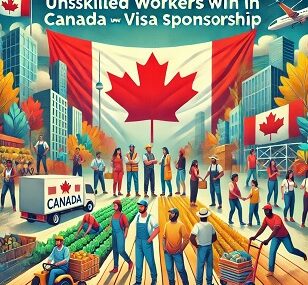Unskilled Domestic Jobs in Belgium with Visa Sponsorship
Introduction
For many job seekers in Africa, Asia, and Latin America, working in Europe presents opportunities for legal work, better pay, and improved quality of life. Belgium is often considered for such opportunities. Domestic work (cleaning, housekeeping, caregiving, support roles in homes or small residential settings) falls under unskilled or low-skilled job categories, which often have lower formal qualification requirements.
A frequent question is: can someone who doesn’t have high formal training still move legally to Belgium to work in domestic roles-, and will the employer sponsor the visa? The answer is: sometimes yes, under certain conditions. Employers must follow Belgian / EU work permit laws, and many will only sponsor if there is a labor shortage in that sector, or they cannot find someone locally or within the EU.
This guide walks you through all that: what “unskilled domestic roles” mean in Belgium, visa and work permit routes, what employers expect, salaries, how to apply, risks, and tips to improve your chances.
What Counts as Unskilled Domestic Work
Roles that are commonly considered “unskilled domestic jobs” include:
-
Housekeeper / residential cleaner
-
Maid / household cleaning assistant
-
Kitchen helper (in private homes)
-
Elderly care aide in private home settings (non-clinical, helping with daily living)
-
Childcare assistant in a home (babysitting or support)
-
Laundry / ironing assistant
These are generally non-regulatory roles, meaning that formal licenses or certificates are not always required. However, “unskilled” does not mean no requirements at all — employers often expect dependability, basic communication, trustworthiness, and sometimes basic language skills in French, Dutch or German depending on region.
Unskilled Domestic Jobs in Belgium with Visa Sponsorship
Visa & Work Permit Requirements
1. Who Needs a Permit?
If you are a non-EU / non-EEA / non-Swiss citizen, you generally need a work permit + residence permit to legally work in Belgium. These may come together under what is called the single permit system (work + stay).
2. What the Employer Must Do
-
The employer must offer a legitimate job contract for the domestic role.
-
Often, the employer has to show they could not fill the position locally or from within the EU. This is to protect local labor markets.
-
The employer may need to apply for the permit on your behalf or support your application.
3. Types of Permits
While for unskilled domestic work, the common permit is the single permit, there may be other types depending on region and contract:
-
Temporary work permit (if work is seasonal or short-term)
-
Employer-sponsored permit that matches the contract duration
-
Residence permit linked to work
4. Required Documents & Conditions
To obtain the permit, typical documents / conditions include:
-
Valid passport with sufficient duration
-
Job offer / contract specifying role, hours, wage
-
Proof of identity, possibly proof of address or accommodation in Belgium
-
Clean criminal record certificate
-
Medical fitness (sometimes medical check)
-
Possibly basic language skills or willingness to learn
Realistic Chances and Challenges
Before assuming visa sponsorship is easy, here are realities to understand:
-
Belgium grants relatively few residence permits just for work reasons, compared to other reasons (family, study etc.). One data source said only ~11.6% of residence permits in recent years were for work reasons.
-
For domestic (unskilled) jobs, many employers are reluctant to sponsor non-EU workers because of bureaucracy, cost, and administrative burden.
-
The salary minimums, permit fees, and qualifying process vary by region (Flanders, Wallonia, Brussels). In some regions, the language requirement (French, Dutch, German) is more strongly enforced.
Employers & Sectors Likely to Sponsor
These are sectors / types of employers who are more likely to hire unskilled domestic workers and may provide visa-sponsorship or assist in work permit:
-
Private households with live-in cleaners or maids
-
Small private elder care homes / assisted living facilities (non-clinical roles)
-
Hospitality: small guest houses, boutique hotels, bed & breakfasts needing cleaning staff
-
Cleaning service companies subcontracted by larger businesses (offices, condos)
-
Garden maintenance companies, laundry services, housekeeping for private clients
Larger companies or agencies are more likely to have the administrative capacity to handle permit sponsorship.
Salary and Benefits Expectations
Here are realistic salary / benefit ranges, noting that actual pay depends on region, employer, and whether the job is full-time or part-time:
| Role | Approximate Gross Monthly Salary (EUR) |
|---|---|
| House Cleaner / Maid (in home) | €1,600 – €2,200 |
| Residential Elderly Care Aide (non-medical) | €1,800 – €2,400 |
| Kitchen Helper / Laundry / Ironing | €1,500 – €2,100 |
| Housekeeper / Cleaning Service in Hotels | €1,700 – €2,300 |
Benefits may include:
-
Paid leave / holidays
-
Social security contributions (depending on contract and permit)
-
Possibly lodging if live-in, or an accommodation allowance
-
Health insurance / access under Belgian system once legal status is active
Unskilled Domestic Jobs in Belgium with Visa Sponsorship
How to Apply: Step-by-Step Process
Here’s a detailed guide to applying for an unskilled domestic job in Belgium with visa sponsorship:
-
Search for Job Offers that Mention Visa/Permit Support
Use local Belgian job sites (e.g., Jobat.be, VDAB.be, Forem.be), also international job boards that specify “visa support,” “work permit provided,” or “non-EU welcome”. -
Contact the Employer / Agency
Before applying, send an enquiry: confirm the employer is willing to sponsor a permit or assist with visa formalities. -
Prepare Your Documents
-
Passport
-
CV / Resume (even for domestic work include any housekeeping / caregiving experience)
-
Proof of identity & age
-
Clean criminal record check from home country
-
If any training or experience, proof or reference
-
Evidence you can travel / support yourself until contracts / permits finalize
-
-
Submit Application
Apply directly via employer’s process. Some domestic/cleaning agencies accept applications by email; others via in-person interview. Always keep copies of the application or confirmation. -
Work Contract
Once selected, ensure you have a signed work contract. The contract should clearly state wage, working hours, role, place of work, whether live-in or live-out, rest days, etc. -
Permit Application
Either you or your employer sends permit application to Belgian immigration authorities. The employer often leads this. Permit + residence permit must be valid before you start working legally. -
Relocation, Arrival & Registration
Once permit & visa are approved, travel to Belgium, register with local commune (municipality) or local immigration authority, possibly get a residence card. -
Begin Work with Legal Status
Only begin working once your legal work permit / residence permit is fully in place.
Sample Testimonials & Real-Case Insights
(Based on what people have shared in job forums and reports. Individual outcomes vary.)
-
Some unskilled cleaners or domestic workers reported job offers where the employer paid permit fees, but sometimes you had to wait several months for the official permit.
-
A few domestic workers said that even when visa sponsorship was offered, language was a barrier in interviews or everyday communication in homes; learning basic French or Dutch helped them integrate, maintain job, or get contracts renewed.
-
Live-in jobs often included lodging, but sometimes the lodging was basic; verifying living conditions ahead is important.
How Much Documentation & What to Expect in Interviews
Even for unskilled roles, employers commonly request:
-
Passport (valid at least 12 months)
-
Criminal record / background check (if required by immigration law)
-
Proof of identity and birth certificate or equivalent
-
Some may ask for basic health check or medical certificate
In interviews, you may be asked:
-
Why you want to work in Belgium
-
Your experience in cleaning / domestic tasks or caregiving
-
Whether you can speak or are willing to learn local language(s)
-
Your availability (hours, nights, weekends)
-
Whether you are comfortable with live-in roles or travel
Costs, Timeline, and What to Budget For
When considering unskilled domestic work with visa sponsorship, plan for:
-
Permit processing fees, possible translation of documents
-
Travel to Belgium
-
Initial accommodation and meals until wages begin
-
Time: sometimes permit & visa procedures can take several weeks to several months
Risks & What to Watch For
-
False job offers: Some adverts may claim visa sponsorship but once you arrive, employer may say otherwise. Always confirm in writing.
-
Unregulated employers: Domestic work is less regulated than hospitals / nursing homes. Be sure you have a valid contract.
-
Poor lodging or exploitation: If live-in, ensure lodging is legal, clean and safe. Rest hours & leave days should comply with Belgian labour law.
-
Language & cultural misunderstandings: Miscommunications in domestic settings are common. Being respectful, adaptable helps.
-
Legal status issues: Do not start working before permit is approved; illegal work can lead to deportation and being barred from re-entry.
Unskilled Domestic Jobs in Belgium with Visa Sponsorship
Region & Language Impact
Belgium is multilingual:
-
Flanders: Dutch (Flemish) is main regional language.
-
Wallonia: French is main regional language.
-
Brussels-Capital: Bilingual (French & Dutch), many services in English, but knowing French or Dutch helps.
If you’re working in Wallonia, likely French will be most used; in Flanders, Dutch; in Brussels both. Language affects daily life, social interactions, sometimes pay or job opportunities.
Salary & Wage Laws
Belgium has a national minimum wage (“salaire minimum” / “minimumloon”). As of 2025, this minimum is around €2,029.88 gross per month for full-time work.
Unskilled domestic jobs often pay close to or slightly above minimum wage depending on employer, region, live-in vs live-out, shift work, overtime.
FAQ
Q: Can I find a domestic job in Belgium with visa sponsorship even with no experience?
A: It is possible, but rare. Employers must be able to justify hiring a non-EU worker. Having some experience in cleaning, domestic help, or caregiving, even on a voluntary basis, helps a lot.
Q: Do I need to speak French or Dutch?
A: Not always at first, but knowing some basic French or Dutch will improve your chances of being hired, help with legal/permit formalities, and improve work relationships and daily life.
Q: Is “free work visa” realistic?
A: Sometimes employers cover permit and visa costs, other times you may bear some costs. “Free” usually means employer helps with paperwork and maybe costs, but confirm details.
Q: How long does it take to get the permit and visa?
A: Typically several weeks to a few months, depending on employer, region, completeness of documents, and workload of immigration authorities.
Q: What rights do domestic workers have in Belgium?
A: They have rights under Belgian labour law: minimum wage, rest days, paid holidays, social security contributions (if contract is legal), health and safety protections.
Q: Can I bring family members later?
A: Possibly, depending on the residence permit type and your income. Family reunification laws apply; check region’s rules.
Action Plan: Your Preparation Checklist
-
Update CV with any domestic / caregiving / cleaning experience.
-
Gather all needed documents: passport, identity, criminal record, etc. Get them translated if necessary.
-
Learn basic French or Dutch phrases (region-specific).
-
Search job portals and contact potential employers confirming if visa sponsorship is possible.
-
Budget for visa fees, travel, initial stay etc.
-
Be cautious of any job offer that asks you to pay large fees or requires you to travel before permit is clear.
Conclusion
Unskilled domestic jobs in Belgium with visa sponsorship are possible but come with challenges: you’ll need a job offer, an employer willing to handle permit processes, legal documentation, and often some basic language ability. Salaries are modest but compared to many countries, they can be decent if you factor in cost of living and legal protections.
This guide gives you a full picture — roles, visa paths, realistic expectations, and what you should do right now to increase your chances. If you prepare well, verify employer commitments, and follow procedures legally, you can move to Belgium for domestic work under visa-sponsored conditions.






